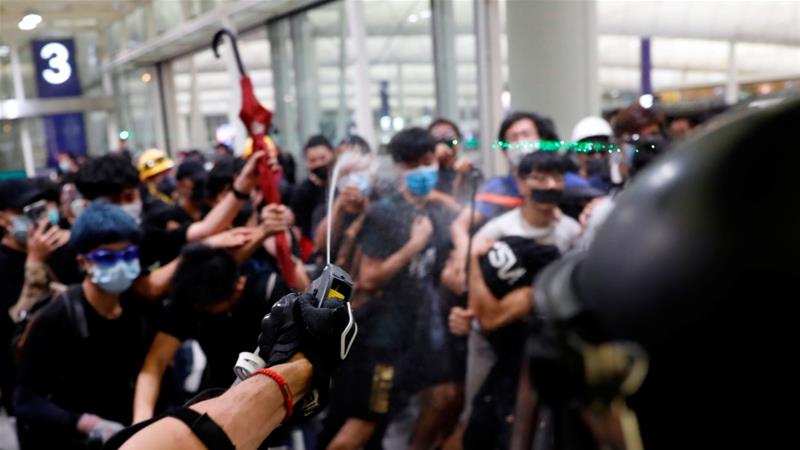Home » World News »
Hong Kong police target protesters with rubber bullets, tear gas
Pro-democracy protesters rally near subway station and major highway as weeks-long political crisis rumbles on.
Hong Kong police have fired rubber bullets, tear gas and pepper spray at protesters in a bid to clear a demonstration outside a subway station in the crisis-wracked semi-autonomous territory, marking the latest clash in 14 weeks of anti-government demonstrations.
Hundreds of protesters, many of them masked and dressed in black, gathered at the Prince Edward station in Mong Kok on Friday behind umbrellas and barricades made from street fencing.
Some had broken through a metal grill to enter the station where they pulled down signs and daubed graffiti on the walls.
The crowds gathered on Friday were expected to swell into the night, as the city braces for weekend demonstrations aiming to disrupt transport links to the airport.
Al Jazeera’s Divya Gopalan, reporting from Hong Kong, said protesters had “taken over a major highway”, where an ongoing demonstration appeared to be an “extension of the earlier protest” at the Prince Edward station.
“We have seen reinforcement from riot police,” Gopalan said.
The airport, meanwhile, announced that only passengers with tickets would be allowed to use the Airport Express train service on Saturday, boarding in downtown Hong Kong. The train would not stop en route to the Kowloon peninsula. Bus services could also be hit, it said.
The measures are aimed at avoiding the chaos of last weekend, when protesters blocked airport approach roads, threw debris on the train track and trashed the MTR subway station in the nearby town of Tung Chung in clashes with police.
Lam backtracks on extradition bill
In a bid to quell the ongoing unrest, Hong Kong leader Carrie Lam earlier this week announced measures, including the formal withdrawal of a bill that originally triggered the demonstrations.
The proposed law would have allowed the extradition of people to any jurisdiction in the world with which it currently has no formal agreement, including mainland China.
Critics argued the bill was part of a wider move by Beijing to scale back the freedoms Hong Kong enjoys under the so-called “one country, two systems” principle put in place as it was handed back to China by Britain in 1997.
The demonstrations, which began in June, have since morphed into broader calls for more democracy and many protesters have pledged to fight on despite the withdrawal of the legislation, branding Lam’s concessions “too little, too late”.
In addition to calling for the release of those arrested during the demonstrations, protesters also want an independent inquiry into perceived police brutality, retraction of the word “riot” to describe rallies, and the right for Hong Kong people to choose their own leaders.
The demonstrations have at times paralysed parts of the city, a major Asian financial hub, amid running street battles between protesters and police, who have responded forcefully at times with tear gas, pepper spray and water cannons.
‘One country, two systems’
Hong Kong’s political crisis – and the sometimes violent arrests of protesters, many in metro stations – have drawn international attention.
On Friday, German Chancellor Angela Merkel raised the issue with Chinese Premier Li Keqiang in Beijing, saying a peaceful solution to the unrest was needed.
“I stressed that the rights and freedoms for [Hong Kong] citizens have to be granted,” Merkel said.
Li said in a news conference with Merkel that “the Chinese government unswervingly safeguards ‘one country, two systems’ and ‘Hong Kong people govern Hong Kong people'”.
Beijing supported the territory’s government “to end the violence and chaos in accordance with the law, to return to order, which is to safeguard Hong Kong’s long-term prosperity and stability”, Li added.
China says Hong Kong is its internal affair. It has denounced the protests, warning of the damage to the economy and the possible use of force to quell the unrest.
The protests have presented Chinese President Xi Jinping with his biggest popular challenge since he came to power in 2012.
Inside Story
Will China run out of patience with Hong Kong protests?
Source: Read Full Article




